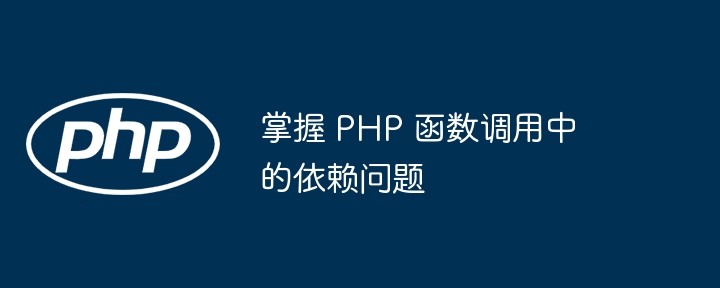Home >Backend Development >PHP Tutorial >Master the dependency issues in PHP function calls
Master the dependency issues in PHP function calls
- PHPzOriginal
- 2024-04-16 18:15:011065browse
Function call dependencies in PHP are crucial to prevent circular dependencies and unexpected behavior. There are two types of dependencies: direct and indirect. Dependency graphs can visualize functional dependencies. Proper order of execution can be ensured by managing dependencies using techniques such as interfaces, dependency injection, and lazy loading. In practice, we can use dependency injection to manage the dependencies of the order total calculation function in an e-commerce application, thereby achieving loose coupling and easy testing.

Master the dependency issues in PHP function calls
In PHP, function call dependencies can help us understand and manage the code dependencies. This is critical for large and complex applications as it prevents circular dependencies and unexpected behavior.
Types of functional dependencies
There are two types of functional dependencies in PHP:
- Direct dependencies: A function calls another function directly.
- Indirect dependency: A function indirectly calls another function through one or more intermediate functions.
Understanding Dependency Graph
In order to visualize the dependencies between functions, we can create a dependency graph. This graph represents functions as nodes and dependencies as edges. For example:
function foo() {
bar();
}
function bar() {
baz();
}
function baz() {
// ...
}In this example, the dependency graph will look like this:
foo -> bar -> baz
Manage dependencies
Manage dependencies are essential to prevent circular dependencies and ensure Proper order of execution is critical. We can use the following techniques to manage dependencies:
- Interface:Use interfaces to define dependencies to keep the code loosely coupled.
- Dependency injection: Pass dependencies as arguments to functions instead of hardcoding them.
- Lazy loading: Load dependencies only when needed to improve performance.
Practical case
Let us consider a simple e-commerce application:
function calculateOrderTotal($order) {
$subTotal = calculateSubTotal($order);
$taxes = calculateTaxes($order);
$shipping = calculateShipping($order);
return $subTotal + $taxes + $shipping;
}In this function, calculateOrderTotal Depends on calculateSubTotal, calculateTaxes and calculateShipping. To manage these dependencies, we can use dependency injection:
function calculateOrderTotal($order, $calculateSubTotal, $calculateTaxes, $calculateShipping) {
$subTotal = $calculateSubTotal($order);
$taxes = $calculateTaxes($order);
$shipping = $calculateShipping($order);
return $subTotal + $taxes + $shipping;
}By using dependency injection, we can easily replace and test these dependencies and prevent circular dependencies in our code.
The above is the detailed content of Master the dependency issues in PHP function calls. For more information, please follow other related articles on the PHP Chinese website!

